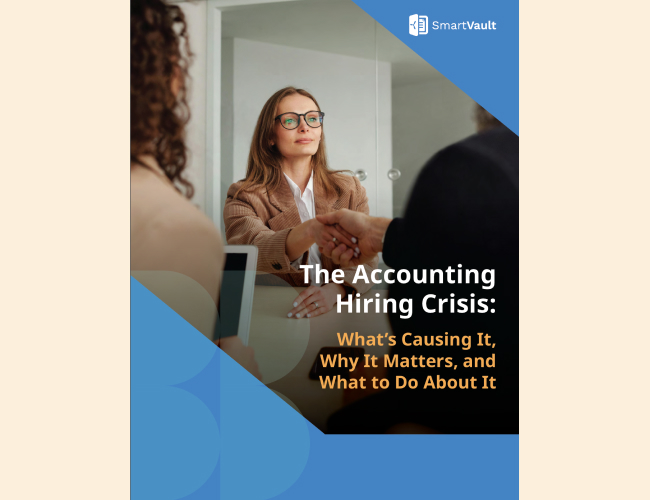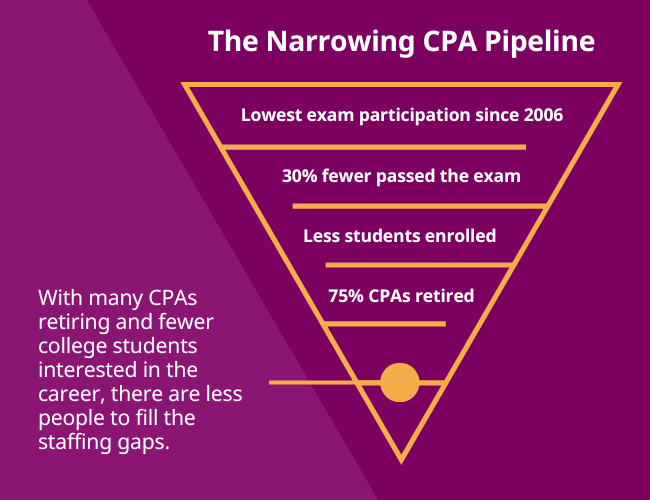The Accounting Hiring Crisis: What’s Causing It, Why It Matters, and What to Do About It
The accounting profession isn’t going out of style anytime soon. Now more than ever, with inflation putting a pinch on the entire economy, families and businesses alike need CPAs and accounting professionals to run a tight ship, keep clean books, and save on taxes.

Introduction
The accounting profession isn’t going out of style anytime soon. Now more than ever, with inflation putting a pinch on the entire economy, families and businesses alike need CPAs and accounting professionals to run a tight ship, keep clean books, and save on taxes.
The crisis in the accounting industry isn’t one of demand — it’s of supply. People are clamoring for the services of great accountants … yet none are to be found. They’re not imagining things.
“Finding qualified talent” tops the list of management challenges in multiple yearly surveys from organizations like the AICPA and the Illinois CPA Society (ICPAS). And, according to the Wall Street Journal, over 300,000 accountants left the profession between the years of 2019 and 2021 — a 17% decline in the talent pool. When you consider that there are between 500,000 and 600,000 accountants in the US (according to 2022 estimates), this translates to a loss of half of the population.
What’s going on, and should your accounting firm be worried? The answer is yes, and this paper will explain why, what’s causing the crisis, and what to do about it.

Why Is It So Hard to Find Accountants to Hire?
If accountants know anything, it's economics. Basic supply and demand — if there's a demand for a service, you would expect a rush of ambitious souls to fill that demand.
So why is that not happening in public accounting? According to Deloitte, in August of 2022, 84.6% of Big Four hiring managers were struggling to find talent to fill vacant positions.
Why is a good accountant suddenly so hard to find? What is driving that decline?
Several factors...
Boomer Accountants Retire
This talent shortage has been brewing since “the early aughts,” according to McRae “Mac” C. Banks, Dean of the Bryan School of Business and Economics at the University of North Carolina at Greensboro. “As long as a lot of people weren’t retiring, it wasn’t a big deal.“That’s changing, and it’s only going to get worse. Nearly 75% of the CPA workforce became retirement age in 2020, according to estimates from the American Institute of Certified Public Accountants (AICPA).
But it takes more than reaching retirement to empty the pipeline of qualified CPA candidates, as we’ll soon see…

Early- and Mid-Career Accountants Leave the Profession
We can’t pin the talent crisis entirely on retiring staff. According to the Bureau of Labor Statistics (BLS), early-career (ages 25-34) and mid-career (ages 45-54) accounting professionals are leaving in droves as well.Why are accountants leaving in the prime of their careers? Accounting Today attributes part of this attrition to the “Great Resignation” — the mass exodus of career professionals in the wake of the COVID-19 pandemic as the culture began to re-evaluate the role of work and career in their sense of personal fulfillment.
Some estimate that the Great Resignation is in the past, but there’s evidence that the exodus from the profession hasn’t even ended. An October 2023 report by the Institute of Management Accountants and Robert Half found that some 24% of accounting and finance professionals plan to leave their jobs within 12 months … 17% within the next six months.

Fewer Students Than Ever are Training to be CPAs
Not only are current CPAs — both retiree and pre-retiree — leaving the profession, but there’s fewer and fewer new accountants to replace them.According to AICPA/CIMA, the number of candidates taking the CPA qualification exam dropped 7%, marking the lowest exam participation since 2006. And 30% fewer passed the final section of the CPA exam in 2021 compared to 2016.
College enrollment in accounting programs bodies similarly dire portent, with bachelor program enrollment 2.8% and masters program enrollment down 8.4%. Private universities have experienced even more precipitous drops, such as a 34% decrease in accounting major enrollment at James Madison University over the four-year period of 2015-2019.
To make matters worse, college enrollment as a whole is expected to decline starting in 2025 due to the opposite of a “baby boom” — declining birth rates. Declining parenthood rates of two decades’ past will begin to bear fruit in the form of labor shortages.

Why the Hiring Crunch Matters
So it's getting harder and harder to find good accountants. Isn't that good news for your accounting firm? Econ 101 — if supply is low and demand is high, jackpot!
Unfortunately, most accounting firms are unlikely to experience the hiring crunch as a windfall profit event. More likely, SMB accounting firms will feel the pinch themselves, and firms on the edge may get squeezed out in large numbers. Two reasons for this:
Firms Can’t Grow
To scale and compete, an accounting firm needs to expand its talent base. Without a deep-enough bench, there’s only so much new business a firm can take on before they buckle.“To respond to the market reality of staffing shortage, accountants are turning away new work,” said Hitendra Patil, President of Global F&A Services for Datamatics Business Solutions, Inc. “Even after making this hard choice, they are hitting burnout.“
Imagine building your firm’s reputation to the point where new business is coming to you … and you have to say “Sorry, we can’t take your money. We’re too understaffed.” Without a pipeline, more and more worthy firms will learn exactly what that feels like.

Understaffed Teams Make More Mistakes
Turning down new work is one thing, but the reality is you can’t always reevaluate and adjust workloads based on team members leaving. There will be times when you’re understaffed – yet another major consequence of the talent shortage.When accounting teams are spread thin, accountants and CPAs are forced to work longer hours under more stressful conditions. This heightened workload and fatigue makes them more prone to make mistakes on tax filings, financial statements, audits, and other critical accounting functions.
“If the people preparing the financials are overworked, or there’s not enough of them, you will have errors,” said Joshua Khavis, assistant professor of accounting and law at the University at Buffalo School of Management.
Overlooking key details can also expose companies to potential audits, fines, and legal liability. Let’s take what happened at Lyft, Inc.: An ‘extra zero’ was added to the company’s earnings press release, showing Lyft would see a margin expansion of 500 basis points. Shares in the company increased nearly 70% within minutes, then dropped significantly when the CFO confirmed the actual increase was 50 basis points. Investors filed a class-action securities lawsuit alleging Lyft defrauded investors. And that’s just one example of how a clerical error – the reason Lyft provided for the mistake – can have dire consequences.

Why Does No One Want to Be an Accountant?
So what happened? Accounting used to be a slam-dunk — recession-proof, high-paying, a no-brainer for stability and prosperity. Why does no one want to be an accountant anymore?
There’s no nice way to say this … Accounting has an unsexy reputation. In an era where celebrities and Instagram influencers garner all the attention, there’s nothing worse than being boring, and in today’s culture “I’m an accountant” holds a definite “snooze” factor.
“The negative image of accounting persists today, even though the accountant’s role has significantly changed for the better,” said Jacqueline A. Burke, PhD, CPA and Ralph S. Polimeni, PhD, CPA. “Gone are the days when accountants spent their day manually adding up columns in smoke-filled back offices. Today’s accountants are at the forefront of many business decisions, using cutting-edge technology to help guide an organization.“
Despite this change in the character of the job, accounting is still a tough sell. Several decades’ worth of “nerd” branding don’t help either.
Since 2015, all 50 states have required 150 credit hours of board-registered to qualify to take the CPA exam. In September of 2023, Texas relaxed that requirement to 120 hours. This is a substantially higher educational burden than many professional career tracks, and it’s one that sometimes just doesn’t add up on paper.
According to Accounting Today, when students consider how expensive it is to graduate college and complete the “150-hour rule” to get a CPA license, “the lure of higher-paying Wall Street and Silicon Valley firms means the time and effort required to become a CPA doesn’t pencil out.”
Of course, students would be willing to go through that crucible if there was a commensurate payoff … but then you have…
Accounting is no longer the best bet for financial prosperity as it once was, with starting salaries for finance and technology majors as much as 20% higher than accounting majors.
As medical and law school attest, people are willing to put in extra work if they can count on a financial advantage. But if students can expect to earn more in other degree paths with less effort, why would they choose accounting?
Hand-in-hand with the “Great Resignation” is a shift in the perception of the role of work in the lives of Millennials and Gen Z. Younger generations place more emphasis on “work/life balance” — the ability to lead an enjoyable and fulfilling life without an all-consuming career.
The historic perception of accounting doesn’t gel with this reprioritization. “One part of that problem is the long-held perception—and probably the reality until recently—about the significant number of hours one has to spend as an associate in an accounting firm,” Banks said, “compared to the number of hours if one is working at an Amazon or a Walmart doing analytics.”
Take Jordan Pixley, who put his attention to detail and love of numbers into his Clemson University accounting classes. The 22-year-old accounting major attended a KPMG LLP recruiting event in Orlando, Florida, but ultimately chose not to apply. He graduated without a job lined up and is exploring opportunities with the U.S. military, according to his interview with the Wall Street Journal. Accounting’s grueling hours—70- and 80-hour weeks are common at the biggest public firms before tax and audit deadlines—were part of the turnoff, he said. “I was a little scared of it, not going to lie,” Pixley said. “I don’t know if I want to do all that.“
All of the above problems fall into a bigger, more overarching problem — accounting is a profession that refuses to “get with the times.” It remains mired like molasses in outdated paradigms:
- Lots of schooling for limited payoff.
- A failure for the compensation to keep pace with skyrocketing costs of living.
- Hesitancy to adopt time-saving, efficiency-boosting technology.
- The tendency to “haze” new hires with busywork that could easily be automated or outsourced.
- Failure to address the “why” of the career — to imbue new hires’ work with a greater sense of purpose.
How Do You Attract Talent Nowadays?
The accounting talent crunch is part of a bigger talent crunch, where companies are finding that the "old" methods of attracting talent to their firms — and their professions at large — are not working anymore.
It's worth taking a moment to locate the accounting hiring crisis in the context of the bigger hiring crisis. How do you attract top talent these days, especially from a limited talent pool?
Pay More
It’s fair to interpret that the jig is up. How do we get more out of our people without paying them more? was only going to work for so long. According to Patil, “Firms are increasing the salaries of their staff in a bid to retain them.“With the cost of living skyrocketing and other professions — even the gig economy — offering more options, accounting firms are going to have to loosen their wallets to attract top people. Supply and demand.
Smart firms are changing the question. Instead of How can we get more without paying more? They are adopting the question: How can we cut enough extraneous costs that we can afford the people we need?

Take Menial Tasks Off Their Plate
It’s a time-honored tradition. What do you do with the grunt work that the senior partners don’t want to do? Give it to the junior associates! It builds character.Well, the junior associates are not having it anymore. They would rather make the same money delivering for Uber Eats, where they can at least listen to podcasts.
Moreover, it’s a self-defeating approach. Many menial tasks that have historically been assigned to junior associates can be automated or outsourced. This has the added benefit of making it more rewarding and stimulating the work of a junior associate who went to the trouble of getting those 150 credit hours and passing the CPA exam. (See below.)

Prioritize Work-Life Balance
Go ahead — make a one-man stand against the cheesy new-age idea of “work-life balance.” Good luck.The truth is, the idea of “work-life balance” isn’t going anywhere. As fewer and fewer younger generations prioritize family life, it becomes harder and harder for them to justify a backbreaking workday. Even those with families are starting to prioritize a smaller house and more time with those families.
Successful SMB accounting firms will lean into this trend rather than fighting it, coming up with creative ways to help top recruits maintain work-life balance, rather than fighting it on principle.

Foster a Sense of Purpose
Younger generations want to feel like their work means something. “Just put your head down and do your job” isn’t good enough, especially if there’s no young family to feed. By making work meaningful again — part of a greater purpose — employers can make even a dry or entry-level role feel like a worthwhile commission.
Steps Accounting Firms Can Take to Counter the Talent Crunch

Here are steps that accounting firms can take to weather the hiring crunch:
Cut Costs
Many firms that think they can’t afford to pay top dollar for talent have actually not gone nearly as far as they could have in terms of cutting costs. The modern organization — accounting or otherwise — prioritizes efficiency. This might include:- Business process automation
- Business process outsourcing
- Reduction of resource consumption
Another cost-saving tip: go paperless. You can reduce expenses related to paper, physical infrastructure, and manual processes through digital, cloud-based technologies like document management systems and client portals.

Digitize, Automate, and Outsource Menial Tasks
Automation and outsourcing of menial tasks has numerous advantages. Not only does it reduce expenses, it makes work more meaningful and manageable for employees.Tasks that accounting firms can outsource include:
- Basic tax preparation and filing
- Payroll services
- Bookkeeping
- Audit support services
- Accounts receivable and payable management
- IT support and maintenance
Tasks that accounting firms can digitize and/or automate include:
- Document management and storage
- Client onboarding
- Expense tracking and reporting
- Invoice processing
- Time tracking and billing
- Compliance monitoring
- Data analysis and reporting

Enable Remote Work
Employers fight it tooth and nail, but the fight is already over. The global economy is a thing, remote work is here to say, and a fully-remote team is perfectly capable of succeeding with the right structure. In fact, remote teams confer the advantage of reduced need for office expenses.For a growing number of employees, requiring in-person 5-days-a-week work is a dealbreaker. It’s a lynchpin of “work-life balance” — no commute, the ability to cook healthy meals or exercise at home, wear what they want to wear, and spend time with their family in comfortable surroundings.
Many companies let relatively trivial concerns derail them from offering remote-work arrangements — for example, the insistence on paper document management rather than cloud-based or online document management. Yes, accounting firms handle sensitive documents and materials, but a secure document management system like SmartVault can relocate sensitive document management to the Cloud. You can cut costs, enable remote work, and save some trees in the process.
By refusing to offer remote work, employers cut their ability to attract up-and-coming talent at the knees. By making the effort to offer the option, they open the door to a vast and growing talent pool — one that might even accept remote work as a concession to replace a higher salary!

Focus on Purpose and Culture
Understand that a paycheck is not enough for your younger recruits. They need a bigger “why” for the work they do for you. You will attract and keep better talent if they feel like their work is not only meaningful, but part of a greater force for good in the world — and a culture of people they care about.
It’s fair to say that the accounting profession is in crisis.
Accounting firms, rightly proud of the role they play in the business community, need to adapt to weather the crisis, as well as contribute to the recovery of the profession.
High-quality talent will be in short supply for some time. To compete and thrive, accounting firms will need to find ways to cut costs and streamline processes so they can sweeten the deal for prized recruits in terms that matter to them — salary, job satisfaction, and work/life balance.
Part of the shift will come from digital transformation and a commitment to modern tools, like SmartVault, which help accounting firms go paperless without compromising security and making the post-pandemic perk of remote work a real possibility.
But more of it will come from a mindset shift — understanding that for the foreseeable future, accounting talent will be a valuable resource. To attract and retain that resource, firms will need to get clear on what they stand for, what they can offer, and what it means to work from them — knowledge that will clarify their brand mission and set them up for long-term success.
How SmartVault Can Help You Proactively Respond to the Accounting Talent Shortage
Like we just covered, the accounting profession is facing an unprecedented talent crisis, with firms struggling to attract and retain qualified staff. This threatening shortage is being driven by several factors – from mass retirements, experienced professionals leaving the field, and not enough new graduates to replenish the talent pool.
For accounting firms looking to remain competitive and continue growing despite this hiring crunch, adopting modern technologies like SmartVault is key. By leveraging SmartVault, your firm can address several key challenges highlighted in this article:See SmartVault in Action
Book a 15-minute demo to see exactly how SmartVault can work for your business.
Schedule A Demo